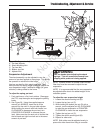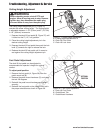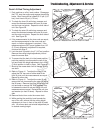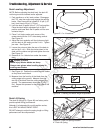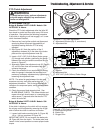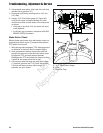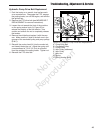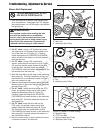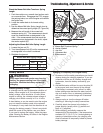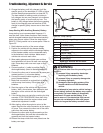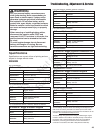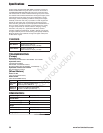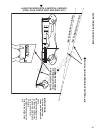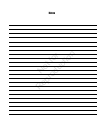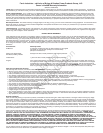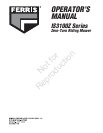
47
Troubleshooting, Adjustment & Service
Check the Mower Belt Idler Tensioner Spring
Length
1. Park the machine on a smooth level surface such
as a concrete floor. Disengage the PTO, engage
the parking brake, turn off the engine and remove
the ignition key.
2. Lower the mower deck to its lowest cutting
position.
3. Use the Mower Belt Idler Spring Length chart to
determine the correct spring length (E, Figure 54).
4. Measure the coil length of the mower belt
tensioner spring (A,). The measurement should
equal the measurement as designated in the
chart. If the measurement does not equal the
measurement as designated in the chart, adjust
the anchor eyebolt (B).
Adjusting the Mower Belt Idler Spring Length
1. Loosen the jam nut (C).
2. Turn the adjustment nut (D) until a measurement
as designated in the chart is achieved.
3. Retighten the jam nut.
Figure 54. Mower Belt Idler Spring Length
A. Mower Belt Tensioner Spring
B. Anchor Eyebolt
C. Jam Nut
D. Adjusment Nut
E. Measurement
D
B
A
E
C
Mower Belt Idler Spring Length
Measurement
inch cm
61” Mower Deck 7 17,8
72” Mower Deck 6-1/4 15.9
Battery Service
Checking Battery Voltage
A voltmeter can be used to determine condition of
battery. When engine is off, the voltmeter shows
battery voltage, which should be 12 volts. When
engine is running, the voltmeter shows voltage of
charging circuit which normally is 13 to 14 volts.
A dead battery or one too weak to start the engine
may not mean the battery needs to be replaced.
For example, it may mean that the alternator is not
charging the battery properly. If there is any doubt
about the cause of the problem, see your dealer.
If you need to replace the battery, follow the steps
under Cleaning the Battery & Cables in the Regular
Maintenance Section.
WARNING
Keep open flames and sparks away from the
battery; the gasses coming from it are highly
explosive. Ventilate the battery well during
charging.
Charging a Completely Discharged Battery
1. Be aware of all the safety precautions you should
observe during the charging operation. If you are
unfamiliar with the use of a battery charger and
hydrometer, have the battery serviced by your
dealer.
2. Add distilled water sufficient to cover the plate (fill
to the proper level near the end of the charge).
If the battery is extremely cold, allow it to warm
before adding water because the water level will
rise as it warms. Also, an extremely cold battery
will not accept a normal charge until it becomes
warm.
3. Always unplug or turn the charger off before
attaching or removing the clamp connections.
4. Carefully attach the clamps to the battery in
proper polarity (usually red to [+] positive and
black to [-] negative).
5. While charging, periodically measure the
temperature of the electrolyte. If the temperature
exceeds 125° F (51.6° C), or if violent gassing or
spewing of electrolyte occurs, the charging rate
must be reduced or temporarily halted to prevent
battery damage.
Not for
Reproduction



